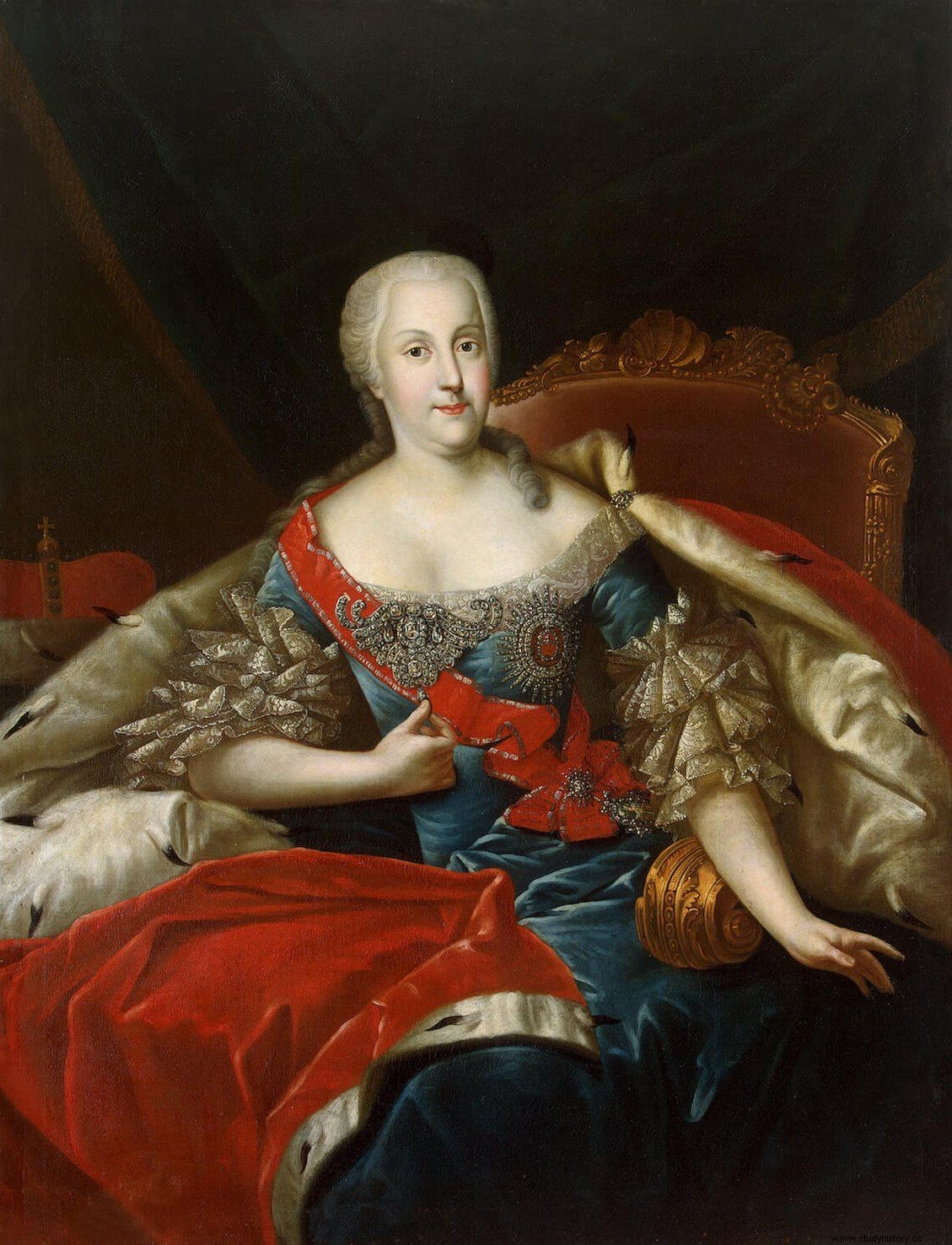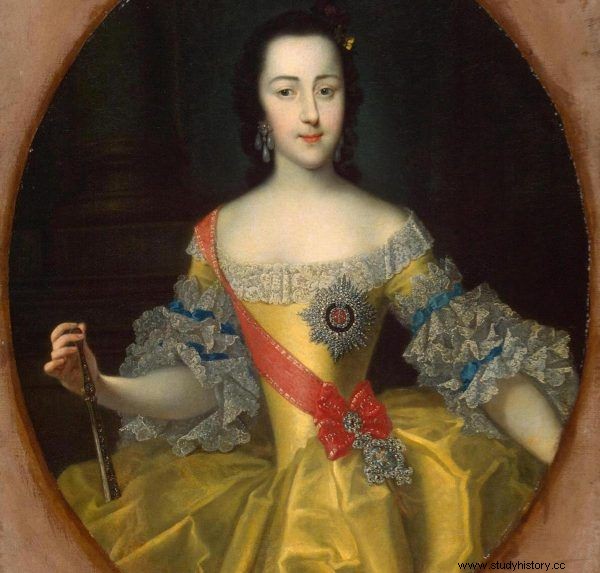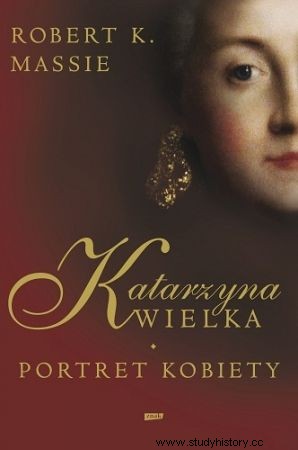Tsarina Katarzyna went down in history as a ruler who first placed her lover on the Polish throne, and then took independence from Poland. But where did this extraordinary woman come from?
Katarzyna was not Russian by birth. In fact, she had almost nothing in common with Russia. She was born on May 2, 1729 in the provincial Prussian garrison on the Baltic Sea - Szczecin. Her father was a German aristocrat from a rather inferior and impoverished family, Prince Christian August von Anhalt-Zerbst. He did not stand out in a crowd of similar Nobels, except that he was a monstrously phlegmatic, well-ordered and bland man. He took a woman of literally the opposite nature as his wife:an adventurous and luxurious gossip.
Princess Joanna von Holstein-Gottorp - because this is what we are talking about - dreamed of a truly courtly life, while she found herself in a sunken hole and, by the decision of her parents, was forced to spend the rest of her life at the side of a terrible bore. On top of that, a poor bore who lived in a small stone house on a cobblestone street, not in any palace.
It was a marriage as unsuccessful as can be imagined. The family problems were further aggravated by the age difference:Joan was only fifteen years old, and Christian August was almost forty.

Joanna von Holstein-Gottorp. She never dreamed that the Cinderella she despised would become a Tsarina! (source:public domain).
The young wife hoped that she would be pulled out of the trap of her relationship with a retired soldier by a male descendant - a son to whom she could pour all her love and attention. Imagine her disappointment when a daughter was born instead of a son. According to Robert K. Massi, the author of the latest biography of Catherine the Great:
Joanna couldn't find her motherly feelings from the beginning. She did not care for her daughter, caress her, sit over the cradle, or carry her in her arms. Without thinking, she placed the child in the care of the servants and nannies (p. 21).
A nightmare childhood
Joanna almost lost her life in childbirth and was forced to spend the next nineteen months in bed. This time was enough for her to hate her child permanently. The baby was given the name Zofia (not Katarzyna!) And grew up without any attention from the parents. Years later, the tsarina recalled in her memoirs:
I learned that my birth was not so much fun (…). My mother hardly noticed me. A year and a half later, she gave birth to a son whom she idolized. I was merely tolerated and often scolded heavily for no reason whatsoever. I felt it, not knowing why it was happening (p. 22).
The French governess, Elizabeth Cardel, was primarily responsible for raising little Zofia. It was she who replaced her mother and she fell in love with Zofia in French culture and language. It was thanks to this woman, forgotten by history, that the tsarina in the future won the admiration of Voltaire and other philosophers and writers from the Seine. She had almost no blame for Miss Cardel, except that she forced her to… memorize things:
I was noticed early on that I had a good memory, so was constantly harassing me to memorize everything . To this day, I have a German translation of the Bible in which all the verses I had to learn are underlined in red (p. 23).
Ugly, arrogant and rebellious brat!
Zofia remembered her catechist much worse - the stiff and pedantic Pastor Wagner. She even said that he was the most ordinary snowman. All because he didn't want to answer her simple questions. When she inquired how it was possible that an infinitely good God was driving people to hell, the catechist threatened her with a rod. He got even more upset when little Sophia asked him to explain the meaning of the word "circumcision" ...
However, Zofia had the worst experiences with her mother, who quickly decided that an arrogant and rebellious child should be kept much shorter. As Robert K. Massie wrote:
Joanna was determined to "chase this devil's pride away from her daughter." She kept telling her daughter she was ugly and cheeky. Zofia was not allowed to speak up first or express her opinion in conversation with adults. She had to kneel and kiss the hem of the dress of all the more distinguished women visiting their home (p. 24).

Catherine the Great as a teenager. Not long after her uncle flirted with her ... (source:public domain).
All this was to make little Zofia the best material for a wife. According to Joanna, a quick marriage was an absolute priority for her daughter. And on this one point, they completely agreed with each other:the mother wanted to get rid of the unwanted child, while the child dreamed of breaking free from her tyrannical tutelage.
It did not seem easy, however. Zofia was supposedly not very pretty. Years later she wrote: I don't know if I was really ugly as a child, but I remember well being told I was so often (p. 26).
Blooming niece

She was definitely not a girl every single bachelor would look to. She only got sick as a teenager. Then - at the age of thirteen or fourteen - she began to grow up for good. Her biographer wrote:
Sensuality was awakening in Zofia. Unable to fall asleep from the excess of nervous energy, she often went to her room at night, where she would sit on the bed, holding a hard pillow between her legs and like on an imaginary horse "I galloped until I was completely exhausted" (p. 28) .
At that time, the first contender for Zofia's hand was found. It was ... her own uncle, Jerzy Ludwik. The man is obviously much older, a bit (by today's standards) slimy and not for a good game. The same uncle: infatuated with the fresh innocence of his blooming niece, he started courting her.
The marriage would probably have happened (because Joanna was ready to do anything to get rid of her daughter!), If not for a unexpected letter from the Russian court ... This is a topic for a separate article.
Meanwhile, a small moral at the end. Avoid, my dear, failed marriages - this is where despots, tyrants and dictators are born ...
Source:
Trivia is the essence of our website. Short materials devoted to interesting anecdotes, surprising details from the past, strange news from the old press. Reading that will take you no more than 3 minutes, based on single sources. This particular material is based on:
- Robert K. Massie, Catherine the Great. Portrait of a woman , Społeczny Instytut Wydawniczy Znak 2012.
